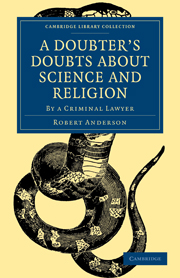Summary
Scepticism is “not a permanent resting-place for human reason.” The knowledge that there is bad money in circulation does not make us fling our purse into the gutter, or refuse to replenish it when empty. The sceptic tries a coin before accepting it, but when once he puts it in his pocket, his appreciation of it is, for that very reason, all the more intelligent and full. A convinced doubter makes the best believer.
With an open mind and unwavering confidence the true sceptic acknowledges a personal God, “the beneficent Creator of the universe.” And in no grudging spirit, but honestly and fully, he will own the obligations and relationships which this involves. Religion is implied in the acknowledgment of God. And further, this acknowledgment removes every a priori objection to the idea of a revelation. Some perhaps might urge that it creates a positive presumption in its favour. If, indeed, we are the offspring of a “beneficent Creator,” is it not improbable that, in a world so darkened by sorrow and doubt, He would leave us without guidance, and without light as to our destiny?
At all events, our belief in God makes it incumbent on us to examine any alleged revelation which is presented to us with reasonable credentials. If some one bring me what purports to be a message or letter from my brother, I may dispose of the matter by answering, “I have no brother;” but if I possess an unknown lost brother, I cannot refuse to receive the communication, and to test its claims on my attention.
- Type
- Chapter
- Information
- A Doubter's Doubts about Science and ReligionBy a Criminal Lawyer, pp. 53 - 65Publisher: Cambridge University PressPrint publication year: 2009First published in: 1889

